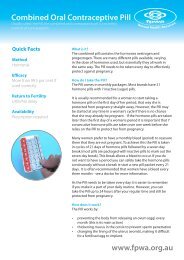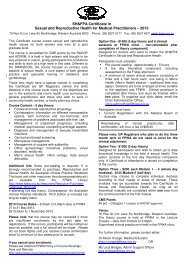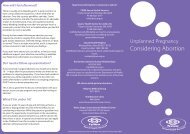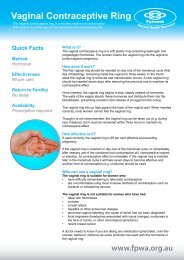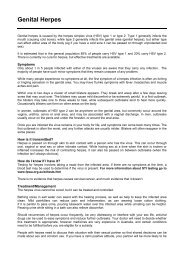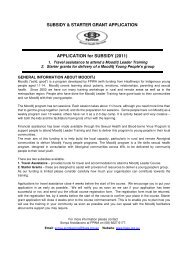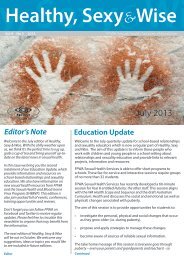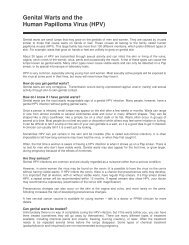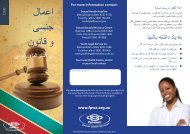ANNUAL REPORT 04 USE - FPWA Sexual Health Services
ANNUAL REPORT 04 USE - FPWA Sexual Health Services
ANNUAL REPORT 04 USE - FPWA Sexual Health Services
You also want an ePaper? Increase the reach of your titles
YUMPU automatically turns print PDFs into web optimized ePapers that Google loves.
F P W A<br />
Annual Report 20<strong>04</strong><br />
<strong>Sexual</strong> <strong>Health</strong> <strong>Services</strong>
Contents<br />
Acknowledgments..........................................................................................................................................................................................................2<br />
President’s Report..........................................................................................................................................................................................................3<br />
CEO’s Report...................................................................................................................................................................................................................4<br />
Roe St Centre for Human Relationships..........................................................................................................................................................5<br />
Clinical <strong>Services</strong>...............................................................................................................................................................................................................6<br />
Education and Training <strong>Services</strong>.............................................................................................................................................................................8<br />
Information <strong>Services</strong>..................................................................................................................................................................................................10<br />
Quarry <strong>Health</strong> Centre for under 25s .............................................................................................................................................................11<br />
Year at a Glance...........................................................................................................................................................................................................12<br />
Magenta.............................................................................................................................................................................................................................16<br />
People 1st Programme.............................................................................................................................................................................................18<br />
Financial Statements...................................................................................................................................................................................................20<br />
Staff ......................................................................................................................................................................................................................................28<br />
<strong>FPWA</strong>’s mission is to provide expertise in sexual and reproductive<br />
health through services, research and advocacy.<br />
1
Acknowledgments<br />
<strong>FPWA</strong> wishes to thank the following people and organisations for their support and financial assistance during<br />
2003-20<strong>04</strong>:<br />
Commonwealth Department of <strong>Health</strong> and Ageing<br />
Department of <strong>Health</strong> - Population <strong>Health</strong><br />
Lotterywest<br />
Disability <strong>Services</strong> Commission<br />
WA <strong>Health</strong> Promotion Foundation (<strong>Health</strong>way)<br />
Ansell International<br />
Foundation for Young Australians<br />
Office for Aboriginal and Torres Strait Islander <strong>Health</strong><br />
<strong>FPWA</strong> Council Office Bearers<br />
President<br />
Dr Lewis Marshall, M.B.B.S., M.P.H., F.A.F.P.H.M, FACSHP<br />
Vice President<br />
Ms Sabina Leitmann, BA DipEd, BSW, Grad Dip (Pub Admin), M.Pol.Sc<br />
Treasurer<br />
Mr John Palmer, B.Bus, CPA, ACIS (Resigned April 20<strong>04</strong>)<br />
Mr Russell Barnett, BComm, Grad Cert (Mineral Econ), MBA (Commenced May 20<strong>04</strong>)<br />
Secretary<br />
Ms Sarah Jaggard, B. Hlth Sci.<br />
Executive Council Members<br />
Ms Laura Christian, BSc, LLB (Hons)<br />
Ms Sandra Toby, BSc Maths, Diploma in Copywriting (Hons)<br />
Ms Karen Vincent, BS Wk, M Soc.Sc (Administration)<br />
Rural representative<br />
Ms Liz Jack, B.Sc.Agric (Hons), Grad Dip (Politics & History) (Resigned January 20<strong>04</strong>)<br />
Ms Vicki Lambert, BA (Psych), Postgrad DipEd., Postgrad Hlth Sci.(Resigned June 20<strong>04</strong>)<br />
Staff representative<br />
Mr Steve Blackwell RMHN, RN, B.Appl.Sci (Nursing), Grad. Dip. Arts (Counselling), Postgrad Dip. (Social<br />
Research and Evaluation)<br />
Ex Officio <strong>FPWA</strong> Management Staff<br />
Chief Executive Officer<br />
Ms Judi St Clair R.N. B.Appl.Sci. MBA (on leave 2003)<br />
Acting Chief Executive Officer 2003 - Director Corporate <strong>Services</strong> 20<strong>04</strong><br />
Ms Jean McGibbon B.Bus. C.P.A.<br />
Life Members<br />
Mr Roy Claughton<br />
Dr Carol Deller<br />
Ms Ros Denny<br />
Dr Gwen Leavesley<br />
Mr Jim Palmer<br />
Dr Myrna Tonkinson<br />
Ms Dorothy Whitaker<br />
2
President’s Report<br />
Once again it is my pleasure to report that <strong>FPWA</strong> is<br />
an organisation that continues to provide sexual and<br />
reproductive health services of the highest calibre to<br />
the people of WA. On behalf of the Council I want to<br />
thank all the staff of the organisation for their<br />
commitment and dedication to the provision of such<br />
excellent services. I would also like to personally thank<br />
the Councillors for their contribution to the<br />
organisation, for without their voluntary services<br />
<strong>FPWA</strong> could not function as efficiently as it does. I<br />
must make mention of our retiring treasurer, John<br />
Palmer. John has provided <strong>FPWA</strong> with five years of<br />
wonderful support in probably the most onerous of<br />
the Council positions. I know that the financial staff<br />
have valued John's efforts, and the term of his<br />
stewardship has been a period of financial<br />
strengthening for the organisation.<br />
A review of the annual report indicates the breadth<br />
and diversity of services in sexual and reproductive<br />
health provided by <strong>FPWA</strong>, and an insight into our<br />
reputation as a lead agency in this field in WA. As<br />
always however, we are not content to rest on our<br />
laurels and staff and Council are always seeking new<br />
initiatives that will result in improved sexual and<br />
reproductive health. A rewrite of our renowned<br />
PASH programme is in train, and funding received for<br />
an innovative programme for Indigenous education.<br />
This year has seen an expansion of our work with<br />
Indigenous communities, and increased service<br />
delivery to others with less access to mainstream<br />
health services. Given that we are an organisation<br />
committed to the sexual and reproductive health of<br />
all Western Australians it is important that we<br />
continue to focus on those in our society with fewer<br />
opportunities.<br />
This year the Commonwealth Government made the<br />
decision to devolve our funding to the States via the<br />
Public <strong>Health</strong> Outcomes Funding Agreement<br />
(PHOFA). Negotiations are underway with the<br />
Department of <strong>Health</strong>, who will administer this<br />
funding. Our solid reputation as providers of high<br />
quality services and previous good relations with this<br />
department as recipients of State health funding have<br />
helped make this a smooth transition. It is likely that a<br />
three-year contract will soon be signed which will<br />
provide us with an opportunity to effectively plan for<br />
the future.<br />
<strong>FPWA</strong> continues to support and value the national<br />
body, <strong>Sexual</strong> <strong>Health</strong> and Family Planning Australia<br />
(SH&FPA), and this year began co-ordinating national<br />
media releases for the organisation. The role of<br />
SH&FPA is an important one. It is vital that we have a<br />
united voice on issues in sexual and reproductive<br />
health and, given the current political climate, that we<br />
continue to contribute to the debate on sexual health<br />
matters at a national level.<br />
The year 20<strong>04</strong>-2005 promises to be even more<br />
exciting for the organisation with a new three-year<br />
strategic plan being finalised in a climate of relative<br />
financial security. Let us continue to invest in services<br />
for the better health of Western Australians.<br />
Lewis Marshall<br />
President<br />
3
CEO’s Report<br />
Welcome to the 2003-<br />
20<strong>04</strong> Annual Report of<br />
<strong>FPWA</strong>. This report marks<br />
my fifth year as the Chief<br />
Executive and I am proud<br />
to report that over the<br />
last five years the<br />
organisation has<br />
continued to grow and<br />
prosper. Back in 1999 my<br />
goals were to develop an<br />
influential organisation<br />
renowned for its<br />
professional activities, with sound collaborative<br />
management practices and a strong infrastructure.<br />
This report demonstrates the many ways in which<br />
these goals have been achieved, and gives us a chance<br />
to reflect on what we have accomplished throughout<br />
the year.<br />
We have come to the end of a strategic planning<br />
period and are preparing to embark on the next<br />
phase. Our plan three years ago was to increase:<br />
sexual health training for Indigenous health and<br />
education workers; access to services for people in<br />
rural WA; and the proportion of socially and<br />
economically disadvantaged and ‘at risk’ people<br />
accessing our services.<br />
Some of the ways we met these goals included:<br />
• Successful ongoing trainee-ships for Indigenous<br />
<strong>Health</strong> Workers – as well as working at <strong>FPWA</strong>,<br />
workers have gone on to employment in sexual<br />
health in the broader community.<br />
• A <strong>Sexual</strong> <strong>Health</strong> Network – with a membership of<br />
over 380 rural and remote health workers who<br />
are supported year-round through<br />
teleconferences, telephone support and e-mail.<br />
• The third state-wide <strong>Sexual</strong> <strong>Health</strong> Forum, bringing<br />
together over 100 members who work in rural<br />
areas.<br />
• The <strong>Health</strong>way-funded ‘Mooditj’ project –<br />
consulting with Aboriginal communities and<br />
developing a sexual health and life skills<br />
programme for very young Indigenous people.<br />
• Sustained State funding to provide special services<br />
for marginalised groups, counselling, and new<br />
education programmes, including relocating clinics<br />
to the regional areas of Rockingham and<br />
Mandurah.<br />
• Continued regional disability services in Albany and<br />
the introduction of services to Bunbury, Busselton<br />
and Collie.<br />
• Re-establishment of the sex worker project and<br />
implementing a new outreach service for streetbased<br />
sex workers.<br />
• An increase in services to disadvantaged youth at<br />
Quarry.<br />
During this reporting period, as well as meeting our<br />
strategic goals we have maintained and grown our<br />
existing services. We have also enhanced our public<br />
profile with prolific media and promotion of sexual<br />
health issues.<br />
A strong collaborative approach is a feature of the<br />
success of many projects. Using a capacity-building<br />
framework, <strong>FPWA</strong> has developed and maintained<br />
cooperative relationships and partnerships with many<br />
agencies and organisations.<br />
<strong>FPWA</strong> has been fortunate to attract many talented<br />
and committed employees who share very strong<br />
social values, as well as finely honed skills in a range of<br />
roles. Without them <strong>FPWA</strong> would not be able to<br />
produce such fine work and make a difference to the<br />
many people for whom we provide services.<br />
Finally, there are a number of people who have<br />
provided key support to <strong>FPWA</strong>’s operations and<br />
deserve recognition. My heartfelt thanks to Jean<br />
McGibbon, who as Acting CEO last year provided<br />
prudent direction through a number of challenging<br />
times. Jean was supported by a very able<br />
Management Committee, in particular Lynne Wilde.<br />
The <strong>FPWA</strong> Executive Council and John Palmer, our<br />
erstwhile Treasurer, are appreciated for their valued<br />
contributions, and finally my sincere thanks to Dr<br />
Lewis Marshall, who is responsible in no small way for<br />
the success of this organisation.<br />
Judi St Clair<br />
Chief Executive Officer<br />
4
Roe St Centre for Human Relationships<br />
<strong>FPWA</strong>’s specialist counselling service, the Roe St<br />
Centre, continues to be not only an expert provider<br />
of direct client services, but a professional training unit<br />
offering services to other units within <strong>FPWA</strong>, as well<br />
as private, non-government and government<br />
organisations.<br />
Counselling<br />
Attendance rates at counselling sessions provided at<br />
Northbridge were steady throughout the year with<br />
97% of clients booked for sessions other than<br />
unplanned pregnancy (UPP) attending their<br />
appointment.This year the majority of sessions were<br />
for relationship issues, in particular those pertaining to<br />
sexuality, which for the first time surpassed UPP as the<br />
main issues for which clients attended counselling.<br />
More than 60% of counselling appointments were<br />
return visits.<br />
This year saw an increase in men attending counselling,<br />
not only for relationship issues, but also for issues<br />
around UPP. Clients in the 25-29 years and the 40 plus<br />
age groups accessed Roe St services significantly more<br />
than any other groups, and comprised more than 45%<br />
of the total number of clients seen.<br />
In July 2003 the fee structure for counselling changed<br />
to one based on a sliding income scale.This affected<br />
the average income generated per appointment,<br />
which is now steadily 25% higher than it was in the<br />
previous financial year.<br />
<strong>Services</strong> to Rural WA<br />
Rural GPs, including those from the Peel division,<br />
accessed the abortion legislation training delivered by<br />
Roe St at the Western Australian Centre for Rural<br />
and Remote Medicine conference in Perth.<br />
Rural projects included the ‘Working 1:1 in <strong>Sexual</strong><br />
<strong>Health</strong>’ programme, which was delivered in Fitzroy<br />
Crossing in the Kimberleys. The programme, available<br />
to health and allied health professionals, consists of a<br />
three-day training package with workshops in rural and<br />
metropolitan locations. Focusing on skills pertaining to<br />
communication in the area of sexual health, the<br />
programme was developed in response to a training<br />
needs-analysis funded by the Department of <strong>Health</strong>.<br />
This year saw the completion of the pilot professional<br />
development programme, ‘Williams Sandpit’.<br />
Delivered in consultation with the Pilbara Division of<br />
General Practice, the programme involved weekend<br />
workshops in Karratha and Point Samson, along with<br />
individual supervision and conferencing through<br />
Telehealth. One of the aims of the programme was to<br />
reduce isolation and in turn improve retention rates of<br />
staff working in these areas. The doctors attending<br />
formed good contacts with other participants,<br />
providing them with ongoing peer support. Evaluations<br />
of the programme were extremely positive, with the<br />
Division requesting it be run again next year.<br />
The Roe St Centre again had input into the provision<br />
of services to rural professionals through participation<br />
in courses run by the Clinic.The service continues to<br />
provide telephone counselling for UPP and post<br />
termination issues to rural areas of WA, via sessions<br />
subsidised by the Department of <strong>Health</strong>.<br />
Community Education and<br />
Information<br />
As an expert consultant on relationship and sexual<br />
health issues, Roe St contributed to media articles on<br />
a variety of topics including talking to children about<br />
sex, relationships and sexuality in later life, and talking<br />
to girls about menstruation.<br />
Professional Education<br />
This year five education seminars were delivered to<br />
GPs under the legislative requirements of the WA<br />
<strong>Health</strong> Act.This project was successfully tendered for<br />
by Roe St and was funded by the Department of<br />
<strong>Health</strong>, with GPs from divisions across the State<br />
accessing these information sessions.<br />
Medical practitioners and students had access to both<br />
internal and external professional programmes run by<br />
Roe St. A lecture on sexual dysfunction was delivered<br />
to Edith Cowan University, rural practitioners<br />
continued to receive professional development,<br />
support and supervision through the Williams Sandpit<br />
programme, and GPs across the State had access via<br />
their divisions to training in the legislative requirements<br />
of the WA <strong>Health</strong> Act regarding abortion.<br />
Roe St continued to expand its role this year through<br />
formal and informal support to <strong>FPWA</strong> staff. Staff<br />
development and training was delivered to both<br />
administration staff and staff from Magenta and the<br />
Sex Worker Outreach Project WA (SWOPWA), and<br />
formal professional supervision is now provided by<br />
senior counsellors to educators employed by these<br />
projects.<br />
5
Clinical <strong>Services</strong><br />
A big challenge for Clinical <strong>Services</strong> this year has been<br />
to balance static funding with increasing wage costs.<br />
To manage this situation the unit chose, unless<br />
essential, not to replace staff on annual, long-service<br />
or sick leave. This measure has ensured that Clinical<br />
<strong>Services</strong> has remained within its budget, but has<br />
resulted in decreased outputs.<br />
<strong>Health</strong> Promotion, Community<br />
Education and Information<br />
The <strong>Sexual</strong> <strong>Health</strong> Helpline (SHH) is a confidential<br />
telephone information service staffed by Advanced<br />
Practice Nurses (APNs). The service, which is funded<br />
by the Department of <strong>Health</strong>’s <strong>Sexual</strong> <strong>Health</strong> and<br />
Blood-borne Virus Program, received 12,062 calls<br />
over the last 12 months. This number is down from<br />
last year because the service was closed over the<br />
Christmas/New Year period, a decision influenced by<br />
the State funding remaining the same for the last few<br />
financial years. E-mail requests continue to account for<br />
3% of the SHH’s workload. The main reasons for<br />
contacting the helpline continue to be for<br />
information about sexually transmissible infections<br />
(STIs) and HIV/AIDS, contraceptive advice and<br />
unplanned pregnancy information. The service is<br />
mainly utilised by women, however 8% of calls are<br />
from males.<br />
Media again helped to highlight services offered by<br />
Clinical <strong>Services</strong> this year, with numerous articles on<br />
sexual and reproductive health issues, in particular<br />
STIs and oral contraceptives, appearing in a variety of<br />
publications.<br />
Professional Education<br />
<strong>FPWA</strong> is the primary agency in WA providing<br />
professional training in the area of sexual and<br />
reproductive health. This is offered through<br />
accredited courses to doctors and nurses, as well as<br />
education programmes designed specifically for other<br />
specialist groups such as pharmacists and Indigenous<br />
health care providers. The sexual and reproductive<br />
health programmes conducted by <strong>FPWA</strong> were<br />
completed by 37 doctors and 26 nurses. Of this<br />
number 50% of the nurses and 41% of the doctors<br />
were from centres outside the metropolitan area.<br />
Clinical educators provided updates to doctors,<br />
nurses and other health workers throughout WA.<br />
While the most requested topic was new<br />
contraceptive technologies, other topics presented by<br />
Clinical <strong>Services</strong> included general sexual health,<br />
endometriosis and the use of Intrauterine<br />
Contraceptive Devices.<br />
Over the last 12 months SHH staff provided 1,005<br />
professional consultations, 33% of which were given to<br />
doctors and 43% to nurses. Telephone consultations<br />
are often provided to rural and remote practitioners<br />
requesting up-to-date information to assist them in<br />
providing appropriate care for their clients. The SHH<br />
also receives requests for information from a variety of<br />
other professionals and agencies including teachers,<br />
pharmacists, Family and Children’s <strong>Services</strong> staff,<br />
academics and journalists to name a few.<br />
Clinical <strong>Services</strong> has again worked closely with<br />
Education and Training <strong>Services</strong> in presenting sexual<br />
health programmes to Marr Mooditj Aboriginal<br />
<strong>Health</strong> College. <strong>FPWA</strong> continues to forge links with<br />
the Schools of Nursing in the tertiary sector to<br />
ensure that sexual and reproductive health issues are<br />
well represented in these institutions. There have also<br />
been negotiations with the Chief Nursing Officer in<br />
WA to ensure <strong>FPWA</strong>’s nursing courses meet the<br />
Department of <strong>Health</strong>’s requirements for<br />
certification.<br />
<strong>Services</strong> to Rural WA<br />
The SHH provides an easily accessible and confidential<br />
service to people living in rural and remote areas of<br />
WA. The country helpline differs from the<br />
metropolitan number in that it is a free call and is<br />
available from 7am-7pm, Monday to Friday and<br />
8.30am-5pm Saturday, allowing access for callers who<br />
use the service outside normal working hours. Where<br />
a postcode was given, 22% of calls from professionals<br />
were from rural areas.<br />
Clinical <strong>Services</strong><br />
Over the last year the Northbridge Clinic provided<br />
11,6<strong>04</strong> consultations. Of these 98% were for booked<br />
appointments, with the remaining being “drop-in”<br />
appointments for repeat oral contraceptives. Most of<br />
the drop-in clients were seen by the SHH APN.<br />
APNs see 44% of all clients attending the Clinic, and<br />
the standard appointment of 20 minutes accounts for<br />
68% of appointments. During these consultations<br />
clients are provided with an average of three services<br />
per visit. “Long” appointments (30 minutes) make up<br />
26% of appointments - these usually relate to<br />
unplanned pregnancy or are a first menopause<br />
appointment, which both require additional time.<br />
Women continue to access the Clinic more than men<br />
do, with men accounting for only 4% of clients.<br />
6
The age groups attending the Clinic have remained<br />
fairly constant, with people under 30 representing<br />
48% of clients, 30 to 39 year olds representing 28%,<br />
and the remainder being 40 years or older.<br />
People attending the Clinic for testing primarily<br />
attended for Pap smears and STIs. Advice about and<br />
provision of contraceptives occurred at 34% of clinic<br />
visits, with the oral contraceptive pill still the most<br />
prescribed of all contraceptives requested (65%).<br />
Around 9% of all clinic attendances resulted in a<br />
referral. Of these referrals, 58% were for specialist<br />
medical follow-up and 30% were for termination of<br />
pregnancy.<br />
A new sexual health clinic for men commenced one<br />
day a fortnight in April, covering all aspects of sexual<br />
health and staffed by a male clinician. The clinic has<br />
proved very popular, with appointments usually fully<br />
booked several weeks in advance.<br />
Clinical <strong>Services</strong> offered 793 clinical teaching sessions<br />
in 2003-20<strong>04</strong>, which is 35% of the Clinic’s workload.<br />
Partnerships and Linkages<br />
<strong>FPWA</strong> continues to provide Midland Women’s <strong>Health</strong><br />
Care Place with APN support to run its clinic in<br />
Midland. <strong>FPWA</strong> also provides relief-nursing support<br />
to the East Metropolitan Population <strong>Health</strong> Unit so that<br />
the Women’s <strong>Health</strong> Programme can continue during<br />
periods of staff leave. Both of these organisations<br />
provide services targeting Indigenous women.<br />
Clinical <strong>Services</strong> was again contracted by Hollywood<br />
Private Hospital to provide two Pap Smear Clinics<br />
and two Menopause Clinics as part of its Staff<br />
Wellness Program.<br />
The last year has seen good collaborative working<br />
relationships established between <strong>FPWA</strong> and the WA<br />
AIDS Council, and between <strong>FPWA</strong> and the Perth and<br />
Hills Division of General Practice, working on joint<br />
sexual health projects.<br />
Students from the West Coast College of TAFE, the In-<br />
Step Program and various secondary schools have<br />
completed work experience placements with Clinical<br />
<strong>Services</strong>. These students were very motivated and<br />
assisted Clinical <strong>Services</strong> with its quality assurance<br />
programme by undertaking Client Satisfaction Surveys.<br />
Research<br />
Clinical <strong>Services</strong> undertook two research projects this<br />
year. The first was a nursing project that saw female<br />
clients offered self-insertion of speculum when having<br />
a Pap smear. The second project involved <strong>FPWA</strong> staff<br />
asking clients for the contact details of their GP,<br />
enabling Clinical <strong>Services</strong> to forward test results onto<br />
the client’s doctor. The results of these projects will<br />
be published.<br />
7
Education and Training <strong>Services</strong><br />
Despite undergoing some changes this year, including<br />
a change in management, the Education and Training<br />
<strong>Services</strong> team remained well-equipped to cope with<br />
the growing demand for education and training in<br />
sexual health in WA.<br />
<strong>Sexual</strong> <strong>Health</strong> Network and Forum<br />
Funded by the Department of <strong>Health</strong>, the <strong>Sexual</strong><br />
<strong>Health</strong> Network is now in its fourth year. Established<br />
in 2001, primarily in response to the professional<br />
needs of geographically isolated health professionals,<br />
members meet via state-wide teleconferences and<br />
keep in contact and receive information by e-mail.<br />
Membership has increased significantly over the past<br />
four years and is now at 383, with members coming<br />
from metropolitan, regional, rural and remote areas.<br />
Of this number, 133 members are Indigenous health<br />
workers in the sexual health field.<br />
During 2003 assistance was given to establish and<br />
facilitate the Kimberley Regional <strong>Sexual</strong> <strong>Health</strong><br />
Network. Its success led to a proposal to develop<br />
regional networking in the Goldfields and Pilbara<br />
regions.<br />
At the end of 2003, the two-day <strong>Sexual</strong> <strong>Health</strong> Forum<br />
was held in Perth for the third consecutive year with<br />
health workers from throughout WA attending. The<br />
forum aims to provide participants with the<br />
opportunity to share experiences, successes and<br />
challenges in their work and working environment,<br />
give updates on sexual health issues, and enable<br />
people to network and develop support structures<br />
for their roles as sexual health workers. Feedback was<br />
positive and supportive of further forums.<br />
PASH (Promoting Adolescent <strong>Sexual</strong><br />
<strong>Health</strong>)<br />
The review of the PASH project began at the start<br />
of the year, firstly by looking at the third edition of<br />
the programme and establishing a reference group<br />
(stage one), and then through a consultation process<br />
(stage two).<br />
During stage one the current programme was<br />
reviewed to identify areas that required change. Stage<br />
two saw consultations undertaken to gather<br />
information from representatives of the target groups<br />
- those who deliver PASH, those who participate in<br />
the programme itself and members of the general<br />
community both young and old.<br />
Consultations were conducted with 50 regional and<br />
16 metropolitan groups, with project staff visiting<br />
seven regions and 12 towns. There were 22<br />
consultation groups held with adults in regional areas<br />
and 28 youth events. Metropolitan consultations<br />
consisted of 10 with adults and six with young people.<br />
Over 600 people participated in this phase of the<br />
project - 222 adults and 438 young people ranging<br />
from 12 - 19 years of age. Participants came from a<br />
range of backgrounds, including health workers,<br />
community and school nurses, teachers, youth and<br />
community workers, members of the general public,<br />
young people, school students, students with a<br />
disability and at-risk youth.<br />
Once consultation data has been analysed the project<br />
will progress towards the stages of programme<br />
rewrite, pilot and implementation.<br />
Northam community workers exercising their creativity during a<br />
consultation for the ‘new’ PASH programme.<br />
The ‘Mooditj’ Programme<br />
‘Mooditj’, the Aboriginal word for ‘solid’, is the name of<br />
the <strong>Health</strong>way-funded programme developed for<br />
Indigenous youth aged 11-14. Extensive consultations<br />
with over 200 community members from Kununurra<br />
to Albany contributed to the development of the<br />
programme, which consists of ten sessions around<br />
sexual health and positive lifestyles.<br />
The programme was piloted in ten rural and<br />
metropolitan communities around the State, and was<br />
trialed as an after-school programme and as a camp,<br />
with over 150 young people participating. Forty-three<br />
Indigenous and non-Indigenous community members<br />
from WA and one from NSW were trained to<br />
facilitate delivery of the programme, with the Office<br />
of Aboriginal and Torres Strait Islander <strong>Health</strong><br />
8
contributing funding for the training. Evaluations by<br />
people who participated in the training and ran the<br />
programme with young people were extremely<br />
positive.<br />
A manual has been produced, along with other<br />
resources, to support the ‘Mooditji’ programme. The<br />
programme has generated enthusiastic interest<br />
among Indigenous and non-Indigenous workers and<br />
service providers, as resources of this nature and for<br />
this age group are scarce.<br />
A group of ‘Mooditj’ participants in Roebourne.<br />
Indigenous Educator Project<br />
The Indigenous Educator Project, funded by the<br />
Department of <strong>Health</strong>, is now in its fourth year. This<br />
year is the first time that the project has continued on<br />
into a second consecutive year, which had a focus on<br />
professional training. The project currently employs<br />
three Indigenous Educators who are training to work<br />
in a variety of settings, including rural and remote<br />
areas. The project continues to provide opportunities<br />
for Indigenous workers and <strong>FPWA</strong> to create a closer<br />
working relationship with Indigenous communities.<br />
Nuts and Bolts<br />
‘Nuts and Bolts’ is a five-day sexual health programme<br />
developed over the past year, and is to be trialed in<br />
August 20<strong>04</strong>. It will offer basic sexual health<br />
information and will be considered a prerequisite to<br />
all training programmes offered by Education and<br />
Training <strong>Services</strong>.<br />
Community Education<br />
Education and Training <strong>Services</strong> continued to respond<br />
to community education requests from schools,<br />
colleges and parent groups throughout the year. PASH<br />
and parenting programmes specially adapted to the<br />
needs of institutionalised young people continued<br />
running at Banksia Hill Detention Centre and<br />
commenced at Rangeview Remand Centre. These<br />
programmes are conducted with ongoing groups for<br />
sentenced offenders and as one-off education<br />
sessions for short-stay offenders. Topics covered<br />
include safe sex, risk taking, parenting, communication,<br />
contraception, sexually transmissible infections and<br />
anger management.<br />
Professional Education<br />
Education and Training <strong>Services</strong> ran several<br />
professional training programmes throughout the<br />
year including the Community Educator Course, and<br />
associated electives, and PASH.<br />
Partnerships and Linkages<br />
Many of <strong>FPWA</strong>'s education projects, including the<br />
Indigenous Educator Project and the <strong>Sexual</strong> <strong>Health</strong><br />
Network, have required Education and Training<br />
<strong>Services</strong> to form extensive linkages with a broad<br />
range of agencies throughout WA.<br />
9
Information <strong>Services</strong><br />
<strong>FPWA</strong> believes that everyone should have access to<br />
accurate information that will assist them in making<br />
informed decisions about their sexual health. To help<br />
facilitate this the organisation has an extensive<br />
website, a state-wide library service, an electronic<br />
newsletter and a series of information sheets on<br />
sexual and reproductive health topics. The general<br />
public are also kept informed through news items in<br />
the media and a variety of health promotion events.<br />
<strong>Services</strong> to Rural WA<br />
This year <strong>FPWA</strong>'s National Condom Day safe sex<br />
message,‘Say it with a condom’, reached more people<br />
in country areas of WA than ever before. Promotional<br />
materials were provided to support events in 35 rural<br />
and remote locations, in addition to activities in the<br />
metropolitan area.<br />
One of the <strong>Health</strong>way-sponsored Deckchair Theatre<br />
productions also took the safe sex message to the<br />
country, with a regional tour of Prayer to an Iron God.<br />
The tour dates included many rural high schools,<br />
where post-performance workshops were held. The<br />
workshops allowed young people to discuss sexual<br />
health issues raised by the play, such as teenage<br />
pregnancy, sexually transmissible infections (STIs),<br />
condom use and negotiating safe sex, as well as<br />
broader issues like domestic violence, drug and<br />
alcohol use and youth suicide. Resource material was<br />
distributed to participating schools to enable some of<br />
these issues to be incorporated into classroom<br />
studies and explored in more depth.<br />
<strong>Health</strong> Promotion, Community<br />
Education and Information<br />
<strong>FPWA</strong> distributed health information at a number of<br />
health expos and orientation days at high schools,<br />
TAFEs and universities in 2003-20<strong>04</strong>. The safe sex<br />
message was also promoted at community events<br />
such as the Gay and Lesbian Pride Fairday and the Big<br />
Day Out music festival.<br />
The organisation continued to forge strong links with<br />
the media to ensure that debate on sexual health<br />
issues reached a wide audience. There was a great<br />
response to the 24 media releases distributed over<br />
the last year, and many approaches were made from<br />
the media requesting input to articles or expert<br />
commentary on items in the news. <strong>FPWA</strong> gained<br />
national as well as local exposure with articles in Cleo<br />
and Cosmo magazines.<br />
Professional Education<br />
In addition to supporting the information needs of<br />
those working in sexual and reproductive health, the<br />
<strong>FPWA</strong> library provides resources to support<br />
professionals undertaking training in this area. The<br />
library is also well utilised by students from a diversity<br />
of disciplines, including the expected health areas but<br />
as varied as youth work students exploring risk taking<br />
behaviour and trainee hairdressers looking at infection<br />
control of blood-borne viruses.<br />
Partnerships and Linkages<br />
The most noteworthy partnership for Information<br />
<strong>Services</strong> is the relationship with <strong>Health</strong>way, the<br />
Western Australian <strong>Health</strong> Promotion Foundation.<br />
<strong>Health</strong>way provides the funds and the infrastructure<br />
to target key groups of young people with the Play it<br />
Safe message through its Arts Sponsorship Program.<br />
This year <strong>FPWA</strong> had <strong>Health</strong>way contracts with<br />
Deckchair Theatre, the Blue Room and PICA (Perth<br />
Institute of Contemporary Arts), each with multiple<br />
events.The safe sex message is promoted in creative<br />
ways at the events themselves and in programmes,<br />
newsletters and advertising material. The highly<br />
successful 'Creatures' advertising campaign with PICA<br />
continued to receive excellent feedback throughout<br />
the year.<br />
Links have been strengthened with the WA AIDS<br />
Council this year, with the two agencies joining<br />
together to run a safe sex poster competition in<br />
schools and TAFEs. In the lead up to this World AIDS<br />
Day event, participating education institutions hosted<br />
talks on HIV/AIDS and STIs.The winning entries were<br />
used in displays promoting condom use.<br />
A fruitful partnership was developed with<br />
AdultShop.com this year, with <strong>FPWA</strong> providing<br />
answers to sexual health questions for inclusion on<br />
their website. They also linked to the organisation's<br />
site and posted the new <strong>FPWA</strong> information sheet,<br />
Safe Sex in Toyland, which was developed into a<br />
brochure for distribution though AdultShop.com<br />
stores.<br />
10
Quarry <strong>Health</strong> Centre for under 25s<br />
Quarry continued as an important service, catering<br />
specifically for the sexual health needs of young<br />
people.<br />
<strong>Health</strong> Promotion, Community<br />
Education and Information<br />
This year Quarry ran its annual education stall at<br />
Fremantle TAFE’s student orientation day, educating<br />
many students about sexual health issues. Educators<br />
provided informal education at the City of Melville’s<br />
‘YAK It Up’ youth festival,‘Gosnells Family Festival’ and<br />
at an ‘Indigenous <strong>Health</strong> Day’ in Coolbellup. Quarry<br />
staff also held information stalls at the ‘Great Mates<br />
Basketball Challenge’ run by the Police and Citizens<br />
Youth Club in Hilton Park, and at the launch of the<br />
‘GPs in Schools’ programme, and organised a mobile<br />
Valentines Day promotion through the streets of<br />
Fremantle for National Condom Day.<br />
Quarry provided formal sexual and reproductive<br />
health education to a large number of young people<br />
throughout the year. This was generally conducted<br />
through metropolitan primary and high schools. In July,<br />
Educators ran in-service training for teachers at Port<br />
Community High School. Follow-up student sessions<br />
during the school’s sexual health camp resulted in a<br />
further agency visit and education session at Quarry.<br />
Clinical <strong>Services</strong><br />
Quarry has seven doctor clinics per fortnight, with<br />
nurse clinics three days a week.The Mainly Men clinic,<br />
run by the B2 clinic at Fremantle Hospital, continues<br />
to operate on Wednesday afternoons, seeing on<br />
average five clients each session and encouraging<br />
young sexually active men to attend a youth friendly<br />
clinic for sexual health checks. Clinical services are<br />
provided weekly in Rockingham and fortnightly in<br />
Mandurah, with many older women accessing these<br />
outreach clinics for Pap smears and well women<br />
checks.<br />
The Adolescent <strong>Health</strong> Clinic (AHC), run by the GP<br />
Network Fremantle, offers three GP sessions a week.<br />
The number of clients using the AHC has increased as<br />
referral procedures between mental health agencies<br />
has improved. Funding for the project continues on a<br />
three-monthly basis.<br />
Clients accessing Quarry’s clinical services are<br />
primarily under 25 years, with long-term Quarry<br />
clients referred to Northbridge once they are<br />
between 25-27.The total number of clients accessing<br />
the <strong>FPWA</strong> clinic at Quarry has dropped slightly this<br />
year - this is possibly due to delays in acquiring<br />
replacement clinicians, and clinics not being covered<br />
when staff take leave. The Mainly Men clinic, AHC,<br />
Rockingham and Mandurah clinics have all<br />
experienced significant growth.<br />
Counselling<br />
Attendance at the counselling service at Quarry has<br />
improved, and while the service is mainly accessed by<br />
clients aged over 25, appointments are made and<br />
attended by young people.<br />
Partnerships and Linkages<br />
Quarry was one of 25 organisations to receive funding<br />
for the Foundation for Young Australians “On Track<br />
Leadership Project”. This project aims to recruit and<br />
mentor a group of young people as they identify a youthrelated<br />
health issue and design, develop and deliver a<br />
programme relating to this during the 18-month project.<br />
The Rockingham and Mandurah clinics are the result<br />
of a successful partnership with the Rockingham<br />
Women’s <strong>Health</strong> Centre in helping to meet the needs<br />
of women in the area. Although these clinics do not<br />
have a youth focus, a significant percentage of women<br />
using the service are under 25 years of age. Part Two<br />
of the Rockingham Adolescent Project, undertaken in<br />
conjunction with Derbarl Yerrigan, concluded at the<br />
end of 2003.<br />
Recently Quarry won a grant to deliver an Indigenous<br />
health promotion project called “Giving STIs an Art<br />
Attack”. This project involves working with young<br />
people at Banksia Hill Detention Centre to provide<br />
education on the prevention of STIs, blood-borne<br />
viruses and unplanned pregnancy. They will then use<br />
their knowledge to work with an Indigenous artist to<br />
develop artworks depicting a health promotion<br />
message, which will be developed into promotional<br />
material and distributed to youth agencies.This is part of<br />
a strategy by the Department of <strong>Health</strong> to enlist the help<br />
of peers to promote Indigenous youth sexual health.<br />
11
Year at a Glance<br />
Total Number of Participants/Clients<br />
Clinical and counselling consultations 16,253<br />
Community education 24,910<br />
Professional education and clinical training 8,493<br />
Pages accessed on <strong>FPWA</strong> website 470,021<br />
Media articles published/interviews conducted 102<br />
<strong>Services</strong> to Rural WA<br />
6<br />
13<br />
10 12<br />
16 20<br />
3<br />
5<br />
4<br />
22<br />
21<br />
8<br />
19<br />
18<br />
7<br />
17<br />
15<br />
11<br />
2<br />
14<br />
1. Albany<br />
2. Balgo<br />
3. Bunbury<br />
4. Burringurrah<br />
5. Busselton<br />
6. Carnarvon<br />
7. Collie<br />
8. Coolgardie<br />
9. Denmark<br />
10. Derby<br />
11. Esperance<br />
12. Fitzroy Crossing<br />
13. Geraldton<br />
14. Halls Creek<br />
15. Kalgoorlie<br />
16. Karratha<br />
17. Katanning<br />
18. Narrogin<br />
19. Northam<br />
20. Port Samson<br />
21. Roebourne<br />
22. South Hedland<br />
9<br />
1<br />
12
Community Education<br />
<strong>Health</strong> Information One-to-One Seminars<br />
Promotion * and Advice Education and TOTAL<br />
Workshops<br />
0 - 13 years 21 135 757 913<br />
Youth (14 - 24 years) 1,621 891 466 3,589 6,567<br />
General population 145 13,217 1,165 333 14,860<br />
Other targeted groups (inc sex workers) 1,857 629 84 2,570<br />
Total 1,766 15,986 2,395 4,763 24,910<br />
*These figures only refer to one-to-one education. The number of people at health promotion events<br />
totalled 9,000+.<br />
Community Education<br />
11000<br />
10000<br />
No. of Participants<br />
9000<br />
8000<br />
7000<br />
6000<br />
5000<br />
4000<br />
3000<br />
2000<br />
1000<br />
1<br />
<strong>Sexual</strong>ly<br />
Transmissible<br />
Infections<br />
Contraception<br />
Pregnancy<br />
Protective<br />
Education<br />
Relationships<br />
<strong>Sexual</strong>ity<br />
Main Topics Covered<br />
(more than one topic may be discussed)<br />
13
Professional Education<br />
Courses, Information Conferences Supervised<br />
Workshops and Advice and Forums Placements TOTAL<br />
and Seminars<br />
Medical Practitioners 245 648 23 916<br />
Nurses 247 1,253 18 1,518<br />
Teachers/Educators 227 795 1,022<br />
Disability Workers 154 587 741<br />
Indigenous Workers 134 384 211 729<br />
Multi-disciplinary Workers 1,228 1,870 31 8 3,137<br />
Medical Students 151 38 6 195<br />
Other Students 34 182 19 235<br />
Total 2,420 5,757 242 74 8,493<br />
Professional Education<br />
5000<br />
4500<br />
4000<br />
No. of Participants<br />
3500<br />
3000<br />
2500<br />
2000<br />
1500<br />
1000<br />
500<br />
0<br />
<strong>Sexual</strong>ly<br />
Transmissible<br />
Infections<br />
Contraception <strong>Sexual</strong>ity Pregnancy Protective<br />
Education<br />
Relationships<br />
Main Topics Covered<br />
(more than one topic may be discussed during a course or workshop)<br />
14
Clinical <strong>Services</strong> Provided<br />
Preventative <strong>Health</strong>care<br />
%<br />
STI/sBBVs* 46<br />
Cervical screening 33<br />
Pre-pregnancy screening 4<br />
Breast check 4<br />
Other health investigations 13<br />
Information and Counselling<br />
%<br />
Contraception 30<br />
Breast/cervical cancer 23<br />
STIs/BBVs* 21<br />
Fertility/pregnancy 8<br />
Relationships 7<br />
Menopause 3<br />
<strong>Sexual</strong> assault/abuse 1<br />
Other health issues 7<br />
<strong>Health</strong> Management<br />
%<br />
STIs/BBVs* 39<br />
Menstrual problems 21<br />
Menopause 13<br />
Pregnancy 6<br />
Other health issues 21<br />
Contraception Supplied<br />
%<br />
Oral contraceptive pill 65<br />
Emergency contraception 9<br />
Implanon 7<br />
Progestogen only pill 7<br />
Depo Provera 5<br />
Intrauterine device 5<br />
Diaphragm/cap 2<br />
*sexually transmissible infections/blood-borne viruses<br />
15
Magenta<br />
The most significant event for Magenta this year has<br />
been its development and survival, as the closure of<br />
Phoenix last year meant that <strong>FPWA</strong>’s sex worker<br />
project had to be re-established. From the vision of<br />
the small steering committee that suggested a<br />
preferred structure and had it endorsed by the<br />
Executive Council and the Management Committee,<br />
to the strong team of Educators Magenta now has,<br />
the project has grown and consolidated its staff and<br />
service delivery.<br />
Reaching the position of relative calm Magenta now<br />
finds itself in has not been without many challenges.<br />
Some of these challenges have included: an<br />
unaccepting and at times hostile community/media<br />
attitude to sex workers; lack of acceptance for<br />
Magenta from the national peak body for sex<br />
workers, Scarlet Alliance; recruitment difficulties;<br />
development of new stationery, brochures and<br />
pamphlets; and development of specific policies and<br />
procedures. There have also been some more<br />
enjoyable moments, including: recruitment of fantastic<br />
staff; building of important alliances and partnerships;<br />
opportunities to stretch professionally; a strong sense<br />
of team; and support from the Management<br />
Committee and <strong>FPWA</strong> as a whole for both Magenta<br />
and SWOPWA (Sex Worker Outreach Project WA),<br />
which is now managed out of Magenta.<br />
<strong>Services</strong><br />
Magenta staff now have a schedule that provides<br />
Educators with in-house, outreach and office time<br />
spread over their working week. Outreach occurs<br />
four afternoons a week and a rotating roster ensures<br />
that parlours across the metropolitan area regularly<br />
receive a visit from a Magenta Educator. Private<br />
workers are visited one afternoon a week and are<br />
also encouraged to drop into the office.<br />
SWOPWA (Sex Worker Outreach<br />
Project WA)<br />
The SWOPWA project commenced mid-March with<br />
the recruitment and training of new staff. The first<br />
priority was to establish the service, beginning with<br />
staff training and networking with identified service<br />
providers whose work put them in contact with<br />
street-based sex workers. Staffing for the project<br />
now comprises two Outreach Educators working 18<br />
hours each per week, management four hours per<br />
week and administrative support four hours per<br />
week. The focus of the Educators’ role is outreach<br />
followed by networking, including establishing critical<br />
links with other service providers. As outreach can<br />
only be done in pairs, the project has been slow in<br />
getting this part of the service established. However,<br />
outreach has occurred on Friday and Saturday nights<br />
and Thursday afternoons for a number of weeks.<br />
Partnerships and Linkages<br />
Magenta has established solid working relationships<br />
with many other similar service providers, with the<br />
Related <strong>Services</strong> Group growing out of these<br />
connections. This group has met monthly since<br />
November 2003 and has members from the<br />
following agencies: Organised Crime Squad, Street<br />
Prostitution Team, Nyoongar Patrol, Nyoongar<br />
Alcohol and Substance Abuse Service, Next Step, HIV<br />
Case Management, Sex Worker Action Group,<br />
Magenta and SWOPWA. A great achievement of this<br />
group has been the creation of a Sex Worker Liaison<br />
Officer (SWLO) within the Police Department. This<br />
new role is a vital step towards increasing the safety<br />
of sex workers, as Magenta is able to facilitate bridging<br />
the gap between sex workers and the police when<br />
workers have been victims of crime, especially sexual<br />
assault. The SWLO will work directly with sex<br />
workers when they report serious assaults.<br />
Negotiations are currently under way with the<br />
Department of <strong>Health</strong> to commence a sexual health<br />
clinic at Magenta, with pathology services provided by<br />
Royal Perth Hospital. It is expected that sex workers<br />
who do not have a regular GP or who do not<br />
currently access a health service may attend the clinic,<br />
which will be free and anonymous. As the number of<br />
street-based sex workers visiting Magenta increases, it<br />
is hoped this hard to reach and higher risk group will<br />
take advantage of the accessible clinical service.<br />
A Masters student from Curtin University is beginning<br />
research into the health needs of culturally and<br />
linguistically diverse sex workers. Magenta is very excited<br />
to be of assistance in this research and anticipates gaining<br />
valuable information that will help inform future service<br />
delivery to this marginalised group.<br />
Education and Information<br />
Magenta had a total number of 2,806 interactions last<br />
year. Of this figure, 68% of people identified themselves<br />
as working in the areas depicted in Figure 1.<br />
With the closure of Phoenix, sex workers and service<br />
providers were unsure about the future of the sex<br />
worker project, so not surprisingly enquires about the<br />
organisation topped the list of the main topics<br />
discussed (Figure 2).Apart from seeking information on<br />
safer sex, sexually transmissible infections and bloodborne<br />
viruses, many workers wanted to know more<br />
about working conditions, occupational health and<br />
safety issues, and legal issues pertaining to their status<br />
as an employee. With clinical services specific to sex<br />
industry workers planned to commence at Magenta<br />
later this year, it is anticipated that street-based sex<br />
workers and those workers not comfortable seeing<br />
their GP will see the clinician at Magenta.<br />
By the end of June 20<strong>04</strong> SWOPWA had conducted<br />
11 outreach sessions and had contact with 56 sex<br />
workers. In total, SWOPWA interacted with 193<br />
people, comprised of sex workers and key service<br />
providers (Figure 3). Feedback from all people has<br />
been very supportive and positive of SWOPWA<br />
being managed out of Magenta.<br />
16
Figure 1<br />
Magenta interactions with sex workers<br />
1000<br />
900<br />
800<br />
700<br />
600<br />
500<br />
400<br />
300<br />
200<br />
100<br />
0<br />
Brothel<br />
worker<br />
Sex industry<br />
worker<br />
general<br />
Private<br />
Streetbased<br />
Escort<br />
Number<br />
Figure 2<br />
Main topics discussed<br />
2000<br />
1800<br />
1600<br />
1400<br />
1200<br />
1000<br />
800<br />
600<br />
400<br />
200<br />
0<br />
Organisational<br />
Safer sex<br />
Sex industry<br />
STI<br />
HIV/BBV<br />
General query<br />
OHS query<br />
General health<br />
Walfare, legal<br />
Number<br />
Figure 3<br />
SWOPWA interactions by main target group<br />
Sex worker<br />
Allied health<br />
Non health worker<br />
Doctors<br />
General public<br />
17
People 1st Programme (PIP)<br />
Review of<br />
<strong>Services</strong><br />
Responding to the<br />
exponential growth<br />
and diversification of<br />
PIP services during<br />
the last decade, a<br />
review of all service<br />
provision was initiated<br />
this year. A major<br />
focus of this process to date has been the streamlining<br />
of PIP's Entry and Exit Procedures and the further<br />
development of evaluation strategies and tools. This<br />
review is also intended to support the future<br />
expansion and development of PIP services in rural<br />
and regional areas.<br />
Systemic Community Education and<br />
Research<br />
• Needs assessment of human and social<br />
relationships (2000-2003)<br />
Conducted by PIP over a three-year period, this<br />
assessment of teaching staff, health and related<br />
professionals and other service providers prioritised<br />
issues concerning human relationships and sexuality<br />
education needs in metro and regional areas. Data<br />
collected from 458 respondents highlighted issues<br />
concerning: consent, expressing feelings, social<br />
isolation and loneliness, bullying and teasing, social and<br />
interpersonal skills, anger, aggression and violence as<br />
very high priority for timely education/intervention.<br />
This ongoing assessment revealed, particularly in<br />
some locations, the chronic nature of many of these<br />
problems, and thus the urgent need for an effective<br />
local, as well as more systemic response.<br />
• Protective Education Network (PEN)<br />
The importance of protective education as a<br />
proactive approach to the prevention of violence and<br />
abuse is now regarded by medical, educational and<br />
public health practitioners as integral to the physical,<br />
mental and emotional health of communities<br />
everywhere, rather than as a separate social issue.<br />
In 2003 the PIP Manager undertook extensive<br />
consultations with leading key community<br />
stakeholders with regard to the development of a<br />
state-wide Protective Education Network (PEN).<br />
Considerable initial support was offered for the<br />
Network, which would provide scholarships to train<br />
multi-sectorial mentors throughout metro and regional<br />
WA. Building upon PIP's recently successful negotiation<br />
for recurrent core-funding from the Disability <strong>Services</strong><br />
Commission (2003-2007), PEN will ensure further<br />
opportunities for systemic education and community<br />
collaboration to prevent violence and abuse.<br />
• www.people1stprogramme.com.au<br />
Receiving in excess of 15,000 hits in the last year, PIP's<br />
website continues to be a very popular source of<br />
information and education. Strong interest in<br />
research conducted by PIP is ongoing, and keywords<br />
relating to disability, gender, violence, consent and<br />
protective and safety programmes for children were<br />
prominent choices in participants' searches.<br />
Core <strong>Services</strong> - Metropolitan and<br />
Rural<br />
Direct education services provided by the PIP team<br />
for people with a disability and for 'significant others'<br />
in 2003-20<strong>04</strong> totalled 6,500 hours. As in previous<br />
years, the majority of PIP’s clientele were male and<br />
of secondary school age. Evaluations from client<br />
satisfaction surveys indicated that 80% of<br />
participants found their experience with PIP to be<br />
either 'great' or 'good' and to be valuable when<br />
learning about things like:<br />
'How to make friends, feeling good about myself, growing<br />
up; Being assertive, puberty, periods and pimples and<br />
about sex and boys; Public and private, good and bad<br />
secrets; Relationships, being safe, how to control my<br />
anger; Conflict resolution, how to say no and be assertive,<br />
confidence in myself, about myself and feelings; Valuable<br />
communication skills and how to survive better in difficult<br />
situations; How to cool down my temper, how to keep my<br />
friends, and to be more confident and happier.’<br />
Outreach Programmes for Schools<br />
PIP’s 'Kids' Stuff' and 'Be Cool,<br />
Be Safe' school programmes,<br />
running for 6-8 weeks, proved<br />
popular options again this year,<br />
with 18 schools and 240<br />
students from throughout WA<br />
taking part.<br />
Extracts from teacher's<br />
evaluations stressed the<br />
importance of these<br />
programmes for their students,<br />
with comments such as:<br />
18
'[This programme] was very beneficial. It provided<br />
information, gave opportunities to dispel myths; students<br />
have become more open, willing to ask questions and<br />
[for] lots of information; [The programme is] extremely<br />
important. We need it here as all our students are at<br />
risk. We NEED it here.’<br />
Professional Education<br />
More than 800 service provider/professional<br />
consultations were provided to teaching staff, social<br />
workers, community workers, disability staff, allied<br />
health practitioners, medical practitioners, nurses and<br />
other multi-disciplinary workers in the last year.<br />
Nearly 70 teaching staff from metro and regional<br />
areas attended PIP's two-day 'Basic Essentials: A<br />
Protective Education Survival Workshop' in 2003-<br />
20<strong>04</strong>. Demand for these programmes remains<br />
strong, with overwhelmingly positive feedback<br />
asserting great satisfaction at their utility, including:<br />
'I have enjoyed this workshop immensely! I'd have to say<br />
it has been the most effective (in regards to conveying<br />
strategies and messages) I have been to here at <strong>FPWA</strong>.<br />
I feel equipped to start a journey in this area as I have<br />
increased knowledge and feel I am able to access further<br />
information when required’ and 'Everyone should attend<br />
the workshop ASAP!'<br />
Parent Education<br />
In a concerted effort to enhance and encourage the<br />
involvement of parents as partners in our educational<br />
processes, PIP staff provided 892 consultations this<br />
year. Occurring in both centre-based (face-to-face<br />
and by telephone) and outreach contexts (school<br />
meetings), parents have been able to avail themselves<br />
of information, advice and support individually<br />
responsive to the needs and interests of their child<br />
and family.<br />
Partnerships and Linkages<br />
In addition to PIP's innumerable linkages with schools<br />
and community, health, disability and related<br />
organisations in WA, the Manager of PIP was<br />
appointed to a reference group for the publication:<br />
'Silent Voices: Women with Disabilities and Family and<br />
Domestic Violence' (November 2003). This was a joint<br />
project with Edith Cowan University's Centre for<br />
Social Research, People With Disabilities (WA), and<br />
the Ethnic and the Disability Advocacy Centre.<br />
CONTACTS/CONSULTATIONS<br />
Information 20,000+<br />
Education<br />
One-to-one and group 3,715<br />
Parents 892<br />
Service providers/professionals 848<br />
Systemic community and website 15,000+<br />
Counselling 85 *<br />
*This is a six-month figure only as counselling activities are now conducted as part of PIP's revised Entry<br />
Procedure.<br />
19
THE FAMILY PLANNING ASSOCIATION OF WESTERN AUSTRALIA (Inc)<br />
STATEMENT BY THE HONORARY TREASURER<br />
& CHIEF EXECUTIVE OFFICER<br />
The Committee of Management has determined that the Association is not a reporting entity and that this<br />
special purpose financial report should be prepared in accordance with the accounting policies outlined in<br />
Note 1 to the Financial Statements.<br />
The Committee of Management declares that:<br />
a) the financial statements and notes, as set out on pages 22 to 27, present fairly the Association’s financial<br />
position as at 30 June 20<strong>04</strong> and its performance for the year ended on that date in accordance with the<br />
accounting policies described in Note 1 to the financial statements;<br />
b) in the Committee of Management’s opinion there are reasonable grounds to believe that the Association<br />
will be able to meet its debts as and when they become due and payable.<br />
This declaration is signed for and on behalf of the Committee of Management by:<br />
RUSSELL BARNETT<br />
Honorary Treasurer<br />
Dated this 24th day of August 20<strong>04</strong><br />
JUDI ST CLAIR<br />
Chief Executive Officer<br />
20
INDEPENDENT AUDIT <strong>REPORT</strong> TO THE MEMBERS OF<br />
THE FAMILY PLANNING ASSOCIATION OF WESTERN AUSTRALIA<br />
(INC) (“THE ASSOCIATION”)<br />
Scope<br />
We have audited the attached financial report, being a special purpose financial report of The Family Planning<br />
Association of Western Australia (Inc) for the year ended 30 June 20<strong>04</strong> as set out on pages 22 to 27. The<br />
Association’s Committee of Management is responsible for the financial report and has determined that the<br />
accounting policies used and described in Note 1 to the financial statements, which form part of the financial<br />
report, are consistent with the financial reporting requirements of the Association’s Constitution and are<br />
appropriate to meet the needs of the members. We have conducted an independent audit of the financial<br />
report in order to express an opinion on it to the members of the Association. No opinion is expressed as to<br />
whether the accounting policies used are appropriate to the needs of the members.<br />
The financial report has been prepared for distribution to members for the purpose of fulfilling the Committee<br />
of Management’s reporting requirements. We disclaim any assumption of responsibility for any reliance on this<br />
report or on the financial report to which it relates to any person other than the members or for any purpose<br />
other than that for which it was prepared.<br />
Our audit has been conducted in accordance with Australian Auditing Standards. Our procedures included<br />
examination, on a test basis, of evidence supporting the amounts and other disclosures in the financial report<br />
and the evaluation of significant accounting estimates. These procedures have been undertaken to form an<br />
opinion as to whether, in all material respects, the financial report is presented fairly in accordance with the<br />
accounting policies described in Note 1, so as to present a view which is consistent with our understanding of<br />
the Association’s financial position, and performance as represented by the results of its operations and its cash<br />
flows. These policies do not require the application of all Accounting Standards and other mandatory<br />
professional reporting requirements in Australia.<br />
The audit opinion expressed in this report has been formed on the above basis.<br />
Audit Opinion<br />
In our opinion, the financial report presents fairly in accordance with the accounting policies described in Note<br />
1 to the financial statements, the financial position of The Family Planning Association of Western Australia (Inc)<br />
as at 30 June 20<strong>04</strong> and the results of its operations and its cash flows for the year then ended.<br />
BUTLER SETTINERI<br />
PAUL J CHABREL<br />
Chartered Accountants<br />
Partner<br />
Perth Date: 24th August 20<strong>04</strong><br />
21
THE FAMILY PLANNING ASSOCIATION OF WESTERN AUSTRALIA (Inc)<br />
TRADING & INCOME & EXPENDITURE ACCOUNT<br />
FOR THE YEAR ENDED 30th JUNE 20<strong>04</strong><br />
Notes: 20<strong>04</strong> 2003<br />
$ $<br />
TRADING<br />
Sales 274,815 296,478<br />
Less: Cost of Sales 152,380 169,936<br />
SURPLUS ON TRADING 122,435 126,542<br />
INCOME<br />
Federal Grant 1,637,942 1,636,902<br />
State Grants 1,090,390 905,266<br />
Other Grants 334,321 219,784<br />
Contributions from Clients 164,766 178,829<br />
Fees for Training & Consultancy 250,997 262,832<br />
Hire of Facilities & Resources 44,779 44,489<br />
Interest Received 10,473 3,672<br />
Fundraising & Donations 10 125 694<br />
Membership Income 1,105 1,080<br />
Profit (Loss) on Disposal of Assets 1,986 (557)<br />
Sundry Income 4,845 1,544<br />
INCOME FROM GRANTS & OTHER SOURCES 3,541,729 3,254,535<br />
TOTAL INCOME 3,664,164 3,381,077<br />
EXPENDITURE<br />
Advertising & Promotions 26,540 27,835<br />
Bad Debts Written Off 3,013 815<br />
Bank Charges & Interest 5,561 6,567<br />
Cleaning, Laundry & Consumables 43,120 40,589<br />
Depreciation 124,919 132,697<br />
Electricity & Water 28,326 28,451<br />
Insurances & Licences 95,969 92,899<br />
Interest Paid 708 5,845<br />
Printing, Stationery, Photocopying & Records 56,543 62,553<br />
Professional Fees 3 14,250 23,061<br />
Rent, Rates,Taxes & Security 37,359 32,088<br />
Repairs & Maintenance 41,309 81,489<br />
Salaries, Oncosts & Subcontractors 2,586,894 2,593,173<br />
Staff Development & Amenities 25,712 23,018<br />
Subscriptions, Memberships & Levies 24,792 22,246<br />
Telephone, Postage & Couriers 53,932 58,353<br />
Training Materials & Resources 28,487 28,948<br />
Travel 111,518 91,836<br />
TOTAL EXPENDITURE 3,308,952 3,352,463<br />
RETAINED SURPLUS FOR THE YEAR 2 355,212 28,614<br />
22
THE FAMILY PLANNING ASSOCIATION OF WESTERN AUSTRALIA (Inc)<br />
BALANCE SHEET AS AT 30th JUNE 20<strong>04</strong><br />
Notes: 20<strong>04</strong> 2003<br />
$ $<br />
CURRENT ASSETS:<br />
Cash on Hand & at Bank 419,738 13,438<br />
Accounts Receivable & Debtors 32,351 16,256<br />
Prepaid Expenses 17,055 74,402<br />
Stock on Hand 49,312 74,269<br />
TOTAL CURRENT ASSETS 518,456 178,365<br />
NON-CURRENT ASSETS<br />
Property, Furniture & Equipment 4 1,9<strong>04</strong>,449 1,983,530<br />
TOTAL ASSETS 2,422,905 2,161,895<br />
CURRENT LIABILITIES<br />
Trade & Other Creditors 227,092 227,791<br />
Accruals 46,638 88,360<br />
Grants & Fees Received in Advance 5 327,211 363,729<br />
Provisions for Leave 6 296,532 317,610<br />
TOTAL CURRENT LIABILITIES 897,473 997,490<br />
NON-CURRENT LIABILITIES<br />
Long Service Leave Provision 7 139,525 133,710<br />
TOTAL NON-CURRENT LIABILITIES 139,525 133,710<br />
TOTAL LIABILITIES 1,036,998 1,131,200<br />
NET ASSETS 1,385,907 1,030,695<br />
Represented by:-<br />
ACCUMULATED SURPLUS<br />
Retained Surplus to 30th June 2003 915,021 886,407<br />
Surplus for this Year 355,212 28,614<br />
RETAINED SURPLUS to 30th June 20<strong>04</strong> 1,270,233 915,021<br />
RESERVES 8 115,674 115,674<br />
TOTAL ACCUMULATED SURPLUS & RESERVES 1,385,907 1,030,695<br />
23
THE FAMILY PLANNING ASSOCIATION OF WESTERN AUSTRALIA (Inc)<br />
STATEMENT OF CASH FLOWS<br />
FOR THE YEAR ENDED 30th JUNE 20<strong>04</strong><br />
20<strong>04</strong> 2003<br />
CASH FLOW FROM OPERATING ACTIVITIES<br />
$ $<br />
Receipts from grants, clients, donations 3,751,473 3,533,172<br />
Payments to suppliers and employees (3,311,085) (3,309,578)<br />
Interest received 10,473 3,672<br />
Interest paid (708) (5,845)<br />
NET CASH FROM OPERATING ACTIVITIES 450,153 221,421<br />
CASH FLOW FROM INVESTING ACTIVITIES<br />
Payment for plant and equipment (46,353) (36,271)<br />
Proceeds from sale of plant and equipment 2,500 -<br />
NET CASH <strong>USE</strong>D IN INVESTING ACTIVITIES (43,853) (36,271)<br />
CASH FLOW FROM FINANCING ACTIVITIES<br />
Repayment of borrowing - (958,284)<br />
NET CASH <strong>USE</strong>D IN FINANCING ACTIVITIES - (958,284)<br />
NET INCREASE (DECREASE) IN CASH HELD 406,300 (773,134)<br />
Cash at 30th June 2003 13,438 786,572<br />
CASH AT 30th JUNE 20<strong>04</strong> 419,738 13,438<br />
Reconciliation of Cash<br />
For the purposes of this statement of cash flows, cash includes cash on<br />
hand and on-call deposits with banks or financial institutions, net of overdrafts;<br />
and investments in money market instruments maturing within two years<br />
Cash at the end of the year is shown in the balance sheet as:<br />
Cash on Hand 2,363 1,850<br />
Cash at Bank 417,375 11,588<br />
419,738 13,438<br />
Reconciliation of Cash Flow from Operations with Net Surplus<br />
NET SURPLUS 355,212 28,614<br />
NON-CASH FLOWS IN OPERATING SURPLUS:<br />
Depreciation 124,919 132,697<br />
Profit (Loss) on disposal of non-current assets (1,986) 557<br />
CHANGES IN ASSETS & LIABILITIES<br />
Decrease (Increase) in accounts receivable and debtors (16,095) (750)<br />
Decrease (Increase) in prepayments 57,347 4,917<br />
Decrease (Increase) in inventories 24,957 (7,894)<br />
Increase (Decrease) in trade creditors (698) 41,128<br />
Increase (Decrease) in accruals (41,722) (8,845)<br />
Increase (Decrease) in grants/fees in advance (36,518) (13,976)<br />
Increase (Decrease) in current provisions (21,078) 47,861<br />
Increase (Decrease) in long term provisions 5,815 (2,888)<br />
CASH FLOW FROM OPERATIONS 450,153 221,421<br />
24
THE FAMILY PLANNING ASSOCIATION OF WESTERN AUSTRALIA (Inc)<br />
NOTES TO & FORMING PART OF THE FINANCIAL STATEMENTS<br />
FOR THE YEAR ENDED 30th JUNE 20<strong>04</strong><br />
1) SUMMARY OF SIGNIFICANT ACCOUNTING POLICIES<br />
Statement of Accounting Policy<br />
The financial report is a special purpose financial report prepared for use by the members of the<br />
Association. The Committee of Management has determined that the Association is not a reporting<br />
entity.<br />
The report has been prepared in accordance with the requirements of the following Australian<br />
Accounting Standards:<br />
AAS 5 Materiality<br />
AAS 8 Events Occurring After Reporting Date<br />
AAS 28 Statement of Cash Flows<br />
The financial report is prepared on an accruals basis from the records of the Association. It is based<br />
on historical cost and does not take into account changing money values or, except where specifically<br />
stated, current valuations of non-current assets.<br />
Set out below is a summary of the significant accounting policies adopted by the Association in the<br />
preparation of the accounts. Except where stated, these accounting policies have been consistently<br />
applied.<br />
a) Depreciation<br />
Depreciation is calculated so as to write off the cost of each non-current asset over its<br />
expected useful life.<br />
b) Inventories<br />
All inventories are valued at the lower of cost and net realisable value.<br />
c) Long Service Leave<br />
Employees are entitled to long service leave on completion of each period of seven years or<br />
fifteen years of service depending on date of appointment as a permanent employee. The<br />
Association accrues, in full, all long service liability to which employees are presently entitled. In<br />
addition, provision has been made for a proportion of long service leave for employees who<br />
have served less than seven or fifteen years.<br />
25
THE FAMILY PLANNING ASSOCIATION OF WESTERN AUSTRALIA (Inc)<br />
NOTES TO & FORMING PART OF THE FINANCIAL STATEMENTS<br />
FOR THE YEAR ENDED 30th JUNE 20<strong>04</strong><br />
2) SURPLUS FOR THE YEAR<br />
Surplus for the year includes charges and credits for the<br />
following specific items:<br />
20<strong>04</strong> 2003<br />
$ $<br />
Charges<br />
Interest Paid - Bank 708 5,845<br />
Depreciation 124,919 132,697<br />
Provision for Time Off in Lieu (217 ) 5,600<br />
Provision for Annual Leave 5,573 13,350<br />
Provision for Long Service Leave (20,619 ) 26,023<br />
Credits<br />
Interest Received 10,473 3,672<br />
3) AUDITORS' REMUNERATION<br />
Audit Fees 3,500 4,500<br />
Other - -<br />
Total amounts received by auditors of the Association 3,500 4,500<br />
4) PROPERTY, FURNITURE & EQUIPMENT<br />
Land - 70 Roe Street Northbridge at cost 9 & 10 500,000 500,000<br />
Less: Accumulated Depreciation - -<br />
500,000 500,000<br />
Building - 70 Roe Street Northbridge at cost 9 & 10 1,650,000 1,650,000<br />
Less: Accumulated Depreciation (459,287 ) (393,287)<br />
1,190,713 1,256,713<br />
Building Improvements at cost 130,621 130,621<br />
Less: Accumulated Depreciation (60,259 ) (54,509)<br />
70,362 76,112<br />
Motor Vehicles at cost 17,112 7,<strong>04</strong>4<br />
Less: Accumulated Depreciation (356 ) (4,916)<br />
16,756 2,128<br />
Furniture & Equipment at cost 821,476 792,237<br />
Less: Accumulated Depreciation (694,858 ) (643,660)<br />
126,618 148,577<br />
NET BOOK VALUE OF NON-CURRENT ASSETS 1,9<strong>04</strong>,449 1,983,530<br />
5) GRANT INCOME & FEES RECEIVED IN ADVANCE<br />
Income from the following sources has been received by the<br />
Association for projects or training courses that will be<br />
undertaken in the following financial year.<br />
Commonwealth Department of A.T.S.I. 16,009 12,023<br />
<strong>Health</strong> Department of Western Australia 166,587 177,145<br />
Disability <strong>Services</strong> Commission 7,457 (805)<br />
WA <strong>Health</strong> Promotion Foundation 1<strong>04</strong>,025 151,277<br />
Fees from Individuals for Courses & <strong>Services</strong> 21,852 17,103<br />
Other 11,281 6,986<br />
327,211 363,729<br />
26
THE FAMILY PLANNING ASSOCIATION OF WESTERN AUSTRALIA (Inc)<br />
NOTES TO & FORMING PART OF THE FINANCIAL STATEMENTS<br />
FOR THE YEAR ENDED 30th JUNE 20<strong>04</strong><br />
20<strong>04</strong> 2003<br />
6) PROVISION FOR LEAVE - CURRENT<br />
$ $<br />
Provision for Time Off in Lieu 12,288 12,505<br />
Provision for Annual Leave 196,607 191,034<br />
Provision for Long Service Leave (12 months) 87,637 114,071<br />
296,532 317,610<br />
7) PROVISION FOR LEAVE - LONG TERM<br />
Provision for Long Service Leave (13 months -15 years) 139,525 133,710<br />
8) RESERVES<br />
Building Reserve 1<strong>04</strong>,220 1<strong>04</strong>,220<br />
Asset Revaluation Reserve (Library) 11,454 11,454<br />
TOTAL RESERVES at 30th June 20<strong>04</strong> 115,674 115,674<br />
9) DEED OF TRUST<br />
In 1998 a capital grant of $500,000 was provided by The Lotteries<br />
Commission to assist with the purchase of the property at 70 Roe<br />
Street, Northbridge. A caveat has been lodged against the title of<br />
the property by The Lotteries Commission to protect their interest.<br />
The Family Planning Association of WA Inc has entered into a Deed<br />
of Trust with the Lotteries Commission to hold the property on<br />
trust for <strong>FPWA</strong> (77% undivided share) and the Commission (23%<br />
undivided share) as tenants in common. In the event of the<br />
property being sold or used for unauthorised purposes, The<br />
Lotteries Commission may exercise their rights relating to their<br />
share.<br />
10) FUNDRAISING & DONATIONS<br />
<strong>FPWA</strong> wishes to thank its clients and supporters for their generous<br />
donations throughout the year. In accordance with the Fundraising<br />
Voluntary Code of Practice we list below the amounts raised and<br />
costs incurred for each campaign or event.<br />
Costs include all direct expenses incurred, but do not include the<br />
cost of <strong>FPWA</strong> staff wages for time involved in fundraising activities.<br />
Revenue<br />
Costs<br />
Unsolicited Donations<br />
Given spontaneously, not as part of any campaign or event 125 -<br />
27
Staff as at 30 June 20<strong>04</strong><br />
Clinical <strong>Services</strong><br />
Fran Barwick Advanced Practice Nurse<br />
Stephen Blackwell Manager of Clinical <strong>Services</strong><br />
Rosie Brown Nursing Consultant<br />
Kara Cassam Client Support Officer<br />
Judith Collison Pathology Nurse<br />
Angela Cooney Medical Consultant<br />
Shelley Craddock Medical Officer<br />
Alison Creagh Medical Educator<br />
June Day Practice Admin Officer<br />
Elena Donaghy Advanced Practice Nurse<br />
Hilary Drury Advanced Practice Nurse<br />
Kylie Duggan Advanced Practice Nurse<br />
Paul English Client Support Officer<br />
Wendy Fleming Advanced Practice Nurse<br />
Jennifer Hart Medical Officer<br />
Sarah Heather Client Support Officer<br />
Helen Henderson Client Support Officer - Team Leader<br />
Annie Irvine Medical Officer<br />
Jega Jegasothy Medical Officer<br />
Nancy Kennedy Advanced Practice Nurse<br />
Gina Kerrich Medical Officer<br />
Natasha Kowal Medical Officer<br />
Sandie Le Sueur<br />
Hindmarsh Advanced Practice Nurse<br />
Priscilla Masters Client Support Officer<br />
Marilyn Morrison Client Support Officer<br />
Janice Pauling Client Support Officer<br />
Donna Richardson Client Support Officer<br />
Julie Robertson Advanced Practice Nurse<br />
Marnie Rowan GPEAR<br />
Debra Rumble Client Support Officer<br />
Helen Shaw Medical Officer<br />
Sarah Smith Medical Officer<br />
Pam Stephenson Advanced Practice Nurse<br />
Chelsee Sutton Client Support Officer<br />
Kate Tudor Owen Advanced Practice Nurse<br />
Robyn Wansbrough Nurse Educator<br />
Hayley Wicks Medical Officer<br />
Averil Wolfenden Medical Officer<br />
Deborah Wright Advanced Practice Nurse<br />
Gina Zammit Advanced Practice Nurse<br />
Gwenda Zanella Client Support Officer<br />
Corporate <strong>Services</strong><br />
Collette Barbour Bookkeeper<br />
Jean McGibbon Director of Corporate <strong>Services</strong><br />
Peter Samson I.T. Officer<br />
Judi St Clair Chief Executive Officer<br />
Education and Training <strong>Services</strong><br />
Collette Barbour Sessional Educator<br />
Kate Boyle Sessional Educator<br />
Narelle Collier Senior Educator<br />
Alwyn Coyne Trainee Indigenous Educator<br />
Paul English Sessional Educator<br />
Liz George Educator<br />
Alice Iaveta Senior Educator<br />
Kathy Kirwan Senior Educator<br />
Gerard Lockyer Trainee Indigenous Educator<br />
Lisa Lockyer Indigenous Educator<br />
Susan Parker Educator<br />
Leeanne Purdom Senior Educator<br />
Noelene Smith Manager of Education and Training<br />
<strong>Services</strong><br />
Rikki Svendsen Educator<br />
Robyn Wansbrough Senior Educator<br />
Cherie Yiannos Sessional Educator<br />
Human Resources/Admin <strong>Services</strong><br />
Lisa Dunbar Admin Officer<br />
Kirsty Felton Admin Officer<br />
Nanette Garvin Payroll Officer<br />
Monique Holland Admin Officer<br />
Pamela Jackson Admin Officer<br />
Bridget John Admin Officer (Reception)<br />
Justine Spencer Admin Officer<br />
Lyn Ward Manager of Human Resources/Admin<br />
<strong>Services</strong><br />
Cherie Yiannos Admin Officer<br />
Information <strong>Services</strong><br />
Kate Boyle Library Assistant/Sponsorship Officer<br />
Alice Iaveta Publications Officer<br />
Julie Kermode Library Assistant<br />
Rebecca Smith Public Relations Officer<br />
Lynne Wilde Manager of Information <strong>Services</strong><br />
Magenta<br />
Melanie Curtis Educator Team Leader<br />
Paul Davis Educator<br />
Teresa Duffield Admin Officer<br />
Alana Everett Educator<br />
Coryn Keith SWOPWA Outreach Educator<br />
Clare Mannion Educator<br />
Heather Stephenson Educator<br />
Deborah Wright Manager of Magenta<br />
People 1st Programme<br />
Lisa Dare Individual Client <strong>Services</strong> Coordinator<br />
Andrew Goldswain Educator<br />
Lesli Grant Professional Education and Training<br />
Coordinator<br />
Audra Guy Educator<br />
Rene Hardenbol Educator<br />
Vanessa King Educator<br />
Della Perry Researcher/Writer<br />
Veneshaa Svendsen Educator (Metro Schools Student<br />
Programmes Liaison Officer )<br />
Francis Townsend Educator<br />
Ruth KesziaWhiteside<br />
Manager of People 1st Programme<br />
/Disability Consultant<br />
Quarry <strong>Health</strong> Centre<br />
Susan Aguiar Admin Officer<br />
John Bluntschli Counsellor<br />
Angela Cooney Medical Consultant/Medical Officer<br />
Alison Creagh Medical Educator<br />
Paul English Admin Officer<br />
Jane Irvine Manager of Quarry <strong>Health</strong> Centre<br />
Nancy Kennedy Advanced Practice Nurse<br />
Pam Stephenson Advanced Practice Nurse<br />
Wendy Fleming Advanced Practice Nurse<br />
Annalisa Thorburn Admin Officer<br />
Maureen Slaven Medical Officer<br />
Averil Wolfenden Medical Officer<br />
Gina Zammit Advanced Practice Nurse<br />
Roe St Centre<br />
John Bluntschli Counsellor<br />
Wilhelm Hurtz Clinical Psychologist (Registrar)<br />
Kathy Kirwan Senior Counsellor<br />
Christina Manfredi Senior Counsellor<br />
Jenny Monson Senior Counsellor<br />
Kate Tudor Owen Counsellor<br />
Jane Irvine Manager of Roe St Centre/<br />
Counselling Consultant<br />
28
<strong>FPWA</strong><br />
70 Roe Street, PO Box 141, Northbridge, WA, 6865 (08) 9227 6177<br />
<strong>Sexual</strong> <strong>Health</strong> Helpline<br />
(08) 9227 6178 or 1800 198 205 (country callers)<br />
Quarry <strong>Health</strong> Centre for under 25s<br />
7 Quarry Street, PO Box 378, Fremantle, WA, 6959 (08) 9430 4544<br />
www.fpwa-health.org.au



